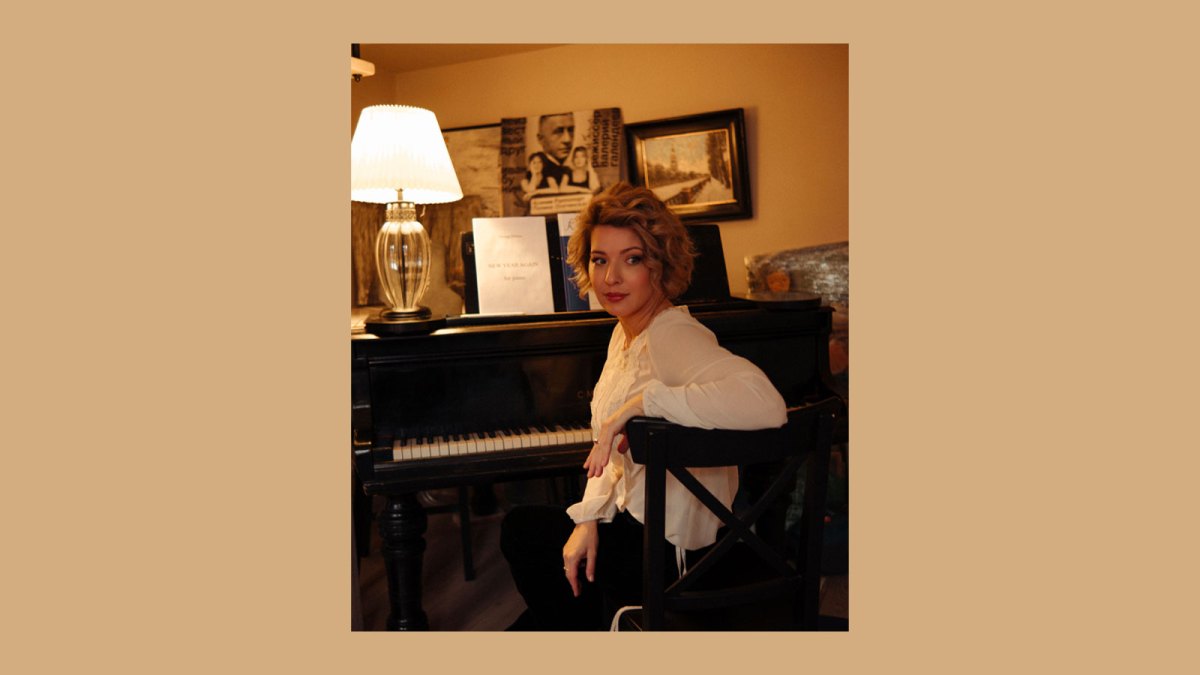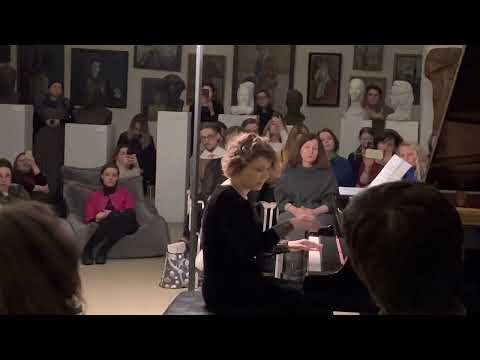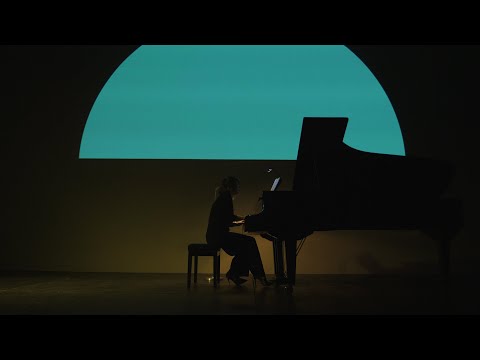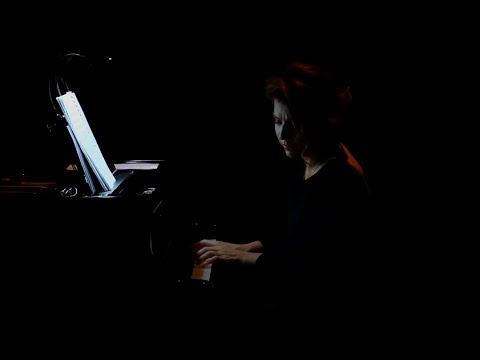At a time of justified anger at Russia’s invasion of Ukraine, it is easy to forget that decency and courage can still be found in the country today. On February 23, 2022, pianist Polina Osetinskaya wrote on her Facebook profile, “Current mood: turn over in your pillow not to see this reality and cry over Handel, whose birthday is today.” Osetinskaya did not turn over when the Russian invasion began a day later. She felt “horror, shame and disgust,” she wrote in a statement to VAN and on social media. Even before that, Osetinskaya had not turned away. She protested the Bolotnaya trials in 2013, spoke up for Kirill Serebrennikov and Pussy Riot, and in February 2021, she was among the first participants, along with London-based Yevgeny Kissin, in a protest by Russian musicians concerning state repression and terror against its own people.
But unlike thousands of Russian artists, students, academics, intellectuals and journalists, Osetinskaya did not leave her country after the invasion. She continues to live in Moscow with her two children. Because of her anti-war stance, which she continuously expresses on social media, all her performances in state concert halls were canceled. “My life has changed a lot—but we know that for millions of people it changed much more dramatically than for me,” she said to me in early February 2023, “I don’t want to hype this in view of the suffering we are causing in Ukraine.” Two weeks later, I reached her on Zoom from her home in Moscow, a day after she returned from a concert in Malaga, Spain—one of several international performances that in recent months have brought Osetinskaya to New York’s Carnegie Hall and Toronto’s Koerner Hall (both with the violinist Maxim Vengerov) among others. “It’s like living in a double world,” she told me. “Now it’s really difficult to perform and introduce yourself outside of Russia, being a Russian artist and feeling very responsible for the war.”
VAN: In your statement from February 24, 2022, you wrote that you felt “horror, shame, and disgust.” Can you describe this “shame”?
Polina Osetinskaya: I never thought that this war might be possible in any way. We were raised with the conviction that war should never happen again after World War II. I’m also ashamed that not all of my friends are against the war. That was what depressed me the most at the beginning of it. Most of my circle was against it, but there were still some people who said, “Oh, finally” [makes a triumphant gesture]. I don’t talk to them anymore, but I’m also ashamed of this. “This too shall pass,” as King Solomon says. This is what I tell myself. But the shame is not going away, and it ruined our lives, the lives of our generation, the lives of our children’s generation. Anything “Russian” is now considered inhuman, and it will take a very long time for that to change.
Putin is now instrumentalizing the historical self-image of Russians as victors over fascism for his own propaganda. In his recent speech in Volgograd, formerly Stalingrad, for example, he talks about Nazism in its “modern manifestation” threatening Russia again.
This is a huge historical tragedy in Russia, because we never called things what they should be called. We never acknowledged the crimes of the revolution, the crime of the assassination of the Tsar’s family, the genocides caused by Lenin, Stalin and the Communist party. The Communists should be pronounced as criminals, but it never happened. In Germany, children learn about the crimes of the Third Reich from an early age in school. In Russia, we never studied our crimes. And now we have come to a point where Stalin is good again. We didn’t blame any of the huge criminals that were supposed to be blamed for their crimes, and they became heroes again. Now they put up Stalin portraits in schools, in hospitals, in public places. It’s like living in a bad dream. When we said “never again,” we never meant our own historical mistakes. Before it was the KGB, now it’s the FSB that runs the country. If I say more about it, I might find myself in jail tomorrow, but in my opinion it’s because we didn’t learn about our historical mistakes.
The harpsichordist Liza Miller wrote in VAN last March, “We thought we were doing our best. But the truth is, we were doing only as much as we felt we were capable of. Could we have stopped the war from happening? I don’t know. But we could have died trying.” Is there such a thing as “collective guilt”? Do you feel guilty?
Of course there is some kind of collective guilt. I’ve always expressed my thoughts and feelings about what’s going on truthfully and loudly. I’ve always stood up for political prisoners in our country and I’ve always fought for the truth. Like Liza wrote, we really thought that we were doing enough, with the little things that we did. But mostly, the shame I experience is that we didn’t change anything, and now we can’t. Thinking of our role is very painful for me.
There is supposedly a list of 37 banned artists, mainly from pop culture, that is sent to promoters within Russia. Is there something similar for classical music? Do you know if you are on such a list?
My concerts in Russia were canceled in all state and government concert halls. I know a couple of musicians personally who were forced to stop performing. There are many denunciations against me: “Polina is still writing bad things about the government,” which I’ve been doing constantly for the last 10, 15 years. I never had concerts in the most important halls here in Russia because of my political positions. I’ve been told by many conductors and many concert hall promoters that I talk too much.
Your concerts in St. Petersburg and Irkutsk last September were canceled at short notice, supposedly for “health reasons.” How is this communicated to you?
In St. Petersburg, they informed me a day in advance. I had just gotten to the city. No one tells me the real reason, but everybody understands the real reason. The only concert that hasn’t been canceled yet is with Vladimir Spivakov in the Moscow House of Music, which is supposed to take place in March. But until I play this concert I don’t know if it’s going to happen, usually they can cancel it half an hour before the performance. Maybe they just didn’t have time to look at the programs yet.
For six years, I’ve been staging a musical performance with the actress Kseniya Rappoport. We do Ivan Bunin’s “Unknown Friend.” Last week, Kseniya was supposed to be doing a play, “Einstein and Margarita,” with actor Alexei Serebryakov. The play was canceled half an hour before, when the people were already in the hall, for “technical reasons.” But everybody knows that Kseniya wrote an open letter of support for Liya Akhedzhakova, the famous 84-year-old actress, who was fired from Sovremennik Theater for her political position—a theater she’s worked at for the last 46 years.
Where are you still allowed to perform?
I can play in small private venues or private concert halls like the DK Rassvet—I just played there with the violinist Elena Revich. There’s also Galereya Niko, an art gallery that’s now run by the daughter of the famous Armenian artist Nikolai Bagratovich Nikogosyan. Yesterday, I played in the Sakharov Center for the 100th birthday of Andrei Sakharov’s wife, Yelena Georgiyevna Bonner. The center is now closing because it was designated a Foreign Agent. So they called me and asked if I could come and play, and I did. I also play in children’s hospices, in hospitals, in private flats. I remember when I was seven, my father would go to the concerts of the big rock groups like Aquarium that were playing concerts in private apartments. This kind of underground culture of the early ‘80s is suddenly coming back. I’ll continue to play in those places, because the people who can’t leave Russia or prefer to stay in their own country and fight as they can for truth need art and music to heal their pain.
In Russian propaganda, there is often talk of a “war on Russian culture” from the West. But the most damage to Russian culture is happening inside Russia. You were at the last event at the Gogol Center before its closure at the end of June; many Russian artists have gone abroad. How do you experience the local art and culture scene now? Are there still events happening that criticize the regime?
There are some small venues that play what could be described as protest content. I don’t want to name them so I don’t put them in a dangerous position. You can still play Bach and Mozart, but you can never be sure whether one day it will be considered the music of the enemy. A lot of people emigrate internally, in their thoughts and minds. Everything is getting increasingly sad. Now the government supports those who are inventing “patriotic” projects. Like festivals of patriotic music about how “being Russian is a great honor,” about how “we will win,” and so on.
Have you ever been asked to participate in such “patriotic projects”?
No.
Outside Russia, there is this general suspicion of Russian artists who have not emigrated, especially of those who—unlike you—have not yet taken a clear public stand against the war. What do you think: Is it the responsibility of every artist to take a stand? Are you an accomplice if you don’t?
There definitely is a responsibility, but I don’t think it can be demanded from the outside, because each person lives in different circumstances and has the right to say what he is not afraid of saying. Under the new legislation introduced shortly after February 24, you can go to jail just for using the word “war.” Anything you say can be called “fake news about the army.” Every word that we say can lead to very unpredictable things. They’re watching all of us, especially those who are not loyal to the regime. I wouldn’t like to be sent to jail. But fear is the most unpleasant feeling that I have experienced in my life, and I just cannot feel it anymore.
There is also a fierce dispute within the Russian community: between those who stayed and those who left, and between those who see a collective guilt for what’s happening and those who don’t. How do you experience that?
Yeah, it’s a terrible problem between those who stayed and those who left. And that is another sad story—victim blaming from both sides. There is, unfortunately, a lot of arguing from a standpoint of moral superiority.
Have you ever considered leaving the country?
I stand by the position that it’s my country, and while I still have a chance to help someone here, I’ll do it. I’m not in jail yet, I can do something for people. But if I find that no one needs my help here, then I might consider the opposite.
Osetinskaya performing at a hospice in Moscow on December 26, 2022
Are you worried that at some point you will be accused for having stayed?
I’ve already been accused. For example, there’s a very famous Ukrainian musician whom I’ve truly and deeply admired for 15 years. In the summer, a friend of mine went to play concerts in Odessa and they met. And they were talking about piano music. My friend sent him the link to my Goldberg Variations, and he was very fond of it. Then he asked: “Where does she live, did she leave Russia?” And my friend said, “No, she didn’t. Her audience is there, her home, her children going to school.” And he said: “Well, if she lives in Russia, then it means that she agrees with what’s going on and she’s supporting the war, so please never send me any links of her [playing] anymore.” It was like a slap in the face.
It is very difficult to explain why that shouldn’t be true. I cannot say anything except: What if all the people who are against the government leave Russia? Who’ll stay? And who’s going to do something new when it’s all over? In every possible place, there are people who understand things and those who do not. The nanny of my children is from western Ukraine, she’s been working with me for seven years, her mother is in Ukraine, her children, everybody. She sends the money I pay her to her family in Ukraine. She’s still with me because we understand what’s going on in each other’s souls and heads.
In February 2022, you wrote, “Although it will be impossible to forget this shameful fact, I ask Ukrainians and the whole world to remember that a lot of Russians do not want and did not want this fratricidal war.” However, this “other Russia” is not the majority, and the longer the war and crimes last, the more invisible it becomes. Do you think it is important that a part of this “other Russia” remains in the country?
I think it’s very important that this part of Russia remains in Russia. There are a lot of these people, but they are afraid to talk. For example, an old friend whom I love deeply is dying of cancer, and yesterday I was trying to connect her with a hospice. They come to your home and do end-of-life care. But what if all those people would go away? Who would stay with the patients, the children, those who need help? So many good doctors have already left Russia since February, among them many of my friends. I still see many beautiful souls here that have no ability to leave or have no wish to leave because they see [staying] as their duty. But they mostly stay silent publicly, because of the danger. People are now writing letters denouncing their neighbors, professors at university, school teachers, if they have another opinion. It’s like under Stalin. There’s a famous saying: “Stalin was a very bad guy, but who wrote the four million letters denouncing their neighbors?”
You know composer Valentyn Silvestrov well and have also recorded and performed his pieces. You played Silvestrov in May 2022 at the same venue where pianist Alexei Lubimov’s concert was disrupted by the police. Have you been in touch with Silvestrov?
I followed his escape from Kyiv closely and forwarded some words to him, but not in person. I don’t want to bother him right now; this is a very difficult situation. I didn’t just play Silvestrov in May—I played him in June and in November too, and I will continue to do so. Silvestrov has become the most important composer nowadays.
Author Viktor Yerofeyev wrote in his diary about his departure from Russia: “It is war, but there is unconsciousness over the country about what is happening. I passed through a Russia that is incapable of apologizing, not knowing for what.” Is that the fault of media propaganda?
Well, if you want to know the real news you also get the real news. Life has been affected in so many different ways that you can only live like nothing has happened if you don’t want to see the truth.
You once wrote, “If I didn’t have to teach Prokofiev’s Third Concerto now, I’d probably go crazy.” How do you avoid going crazy?
In the middle of the summer I was so depressed about what’s going on—every day you saw the next terrible thing. When all the stories about the canceled concerts came in, I was even more depressed, because I have to feed my family. Last October, I was in Yelabuga, in the little house where Marina Tsvetaeva hanged herself in 1941. I was very close to thinking about doing the same. So I came back to Moscow and called my psychiatrist, who said, “You have to start taking pills, otherwise we’ll get your corpse instead of Polina.” And I started to take antidepressants on a heavy dose, which at least made me capable of continuing to get up every day to make breakfast for my children and bring them to school and work a little bit. You deal with the war every day and you get ruined by it because you can’t change anything. Or you can try to help those around you. For example, there are a lot of Ukrainian refugees here in Russia. [Many are forcibly resettled to Russia.—Ed.] My friend opened a fund for the refugees: they need shoes, food, and we just help. This is the only way to deal with it and stay alive.
Anna Akhmatova wrote about Shostakovich’s music in 1957: “It holds a conversation with me alone, when others fearfully flee my proximity. And when the last of my friends looked away, it descended into my grave.” Which music holds a conversation with you now? Which doesn’t?
Right now I can’t play for pleasure. I can’t play Chopin waltzes. A tragedy that’s happening needs to be seen and heard in sounds, in the music that we play. I mostly play Bach and Rameau. I found healing in Rameau’s music.
You wrote to me, “I always think—would Maria Yudina leave? No, she wouldn’t.” What do women like Yudina or Marina Tsvetaeva mean to you right now?
They were not only making art, they were also examples of freedom, moral and intellectual dignity. Maria Yudina was canceled but still went on stage reading the Bible or forbidden poets like Pasternak. These role models show us that even in dark times you can still produce light instead of hate, you can still give hope instead of feeling hopeless, you can still support those who feel worse than you. ¶




